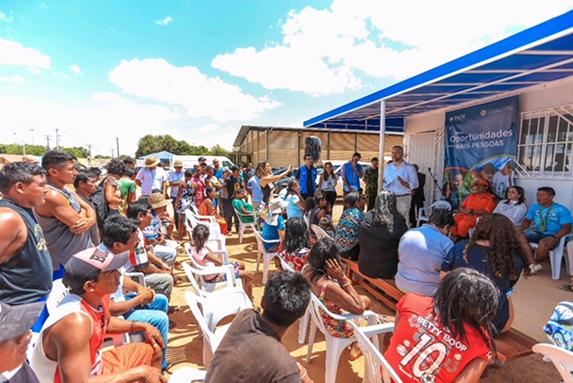Supporting Venezuelan Migrants in Brazil
Canada in Brazil
Humanitarian Assistance
April 17, 2018
Ambassador Savone walks through the grounds of the Immigrant Reference Center Shelter for Venezuelan Indigenous refugees in Boa Vista (Roraima), Brazil
Every morning between 600 and 800 Venezuelans line up in front of Boa Vista’s federal police station to claim asylum or apply for temporary residence in Brazil. They are fleeing the political, economic and humanitarian crises in their home country. Many arrive with pressing health needs.
Since 2015, an estimated 52,000 Venezuelans (including non–registered immigrants) arrive in Roraima, Brazil’s northernmost and least populated state. They now represent close to 15% of the population of Roraima’s capital city, Boa Vista.
This ever–increasing migrant influx has overloaded social services facilities and intensified social tensions in Roraima.
Canada joins forces with local partners to make an impact
A delegation led by Canada’s Ambassador to Brazil recently visited Roraima to introduce two projects sponsored by the Canada Fund for Local Initiatives (CFLI). These projects provide support to the most vulnerable Venezuelan migrants living in Roraima’s shelters, including Indigenous Warao and Panare people.
The delegation launched the projects and met with the State’s Governor, the Jungle Infantry Commander, the Federal Police Superintendent, the United Nations High Commissioner for Refugees (UNHCR), and our project partners, the Pan American Development Foundation (PADF) and Fraternidade International.
The projects, praised locally and in Brazil’s capital, combined with the visit of Ambassador Savone (the first Ambassador to visit Roraima’s shelters), received significant media attention in Brazil. Canada is the first foreign country to provide frontline assistance to the most vulnerable Venezuelan migrants in Brazil.
Minister Freeland announced one of the projects during the October 2017 meeting of the Lima Group, a grouping established to coordinate positions and actions toward the restoration of democracy in Venezuela.
“We must continue to support the Venezuelan people—in the defense of their human rights, and in their basic human needs.” – Hon. Chrystia Freeland, P.C., M.P., Minister of Foreign Affairs, Canada.
The partnership with PADF resulted in the addition of a school and medical clinic for Indigenous migrants in Roraima’s largest shelter, the Immigrant Reference Center.

Ambassador Savone addresses the residents at the Immigrant Reference Center Shelter in Roraima, Brazil.

Ambassador Savone, project partners and members of the delegation with children from the shelter.
Addressing the most urgent needs
Human suffering is most visible in shelters that are above capacity and often lack basic sanitary supplies. Thanks to CFLI, vulnerable migrants receive food and hygiene kits upon their arrival or departure when they are ready to move on. This quick and timely support helps fulfill their most pressing family needs, allowing them time to look for employment opportunities.
Additionally, CFLI provides the infrastructure for a health clinic and a school in a shelter for Indigenous migrants. It provides shelter to residents as well as on-site health services in a private and sanitary location. They can also pursue their education including language training in Portuguese, Spanish and their native language. These educational activities help them to develop skills for their successful integration while protecting their own culture.
“The new clinic and school will create private and dedicated spaces for learning and medical attention, serving hundreds of people displaced by the crisis in their home country.” – Luisa Villegas, Deputy Senior Programs Director of PADF
Strengthening relations between Canada and Brazil
Canada’s leadership in providing timely assistance with targeted CFLI projects, though small, is widely recognized by the Brazilian government, diplomatic community and civil society. As other countries plan their assistance, Brazil remains involved through diplomatic engagement and identifies options for continued CFLI assistance in this new fiscal year.
The Brazilian government, along with UNHCR and the International Organization for Migration (IOM), is in the process of relocating Venezuelan migrants who want to move to other Brazilian States that offer better employment and integration prospects. Brazil is home to many refugees and migrants, including Haitians and Syrians, and Canada is working with Brazilian authorities to share our experience with resettlement and private sponsorship programs.
External resources
- Date modified:





